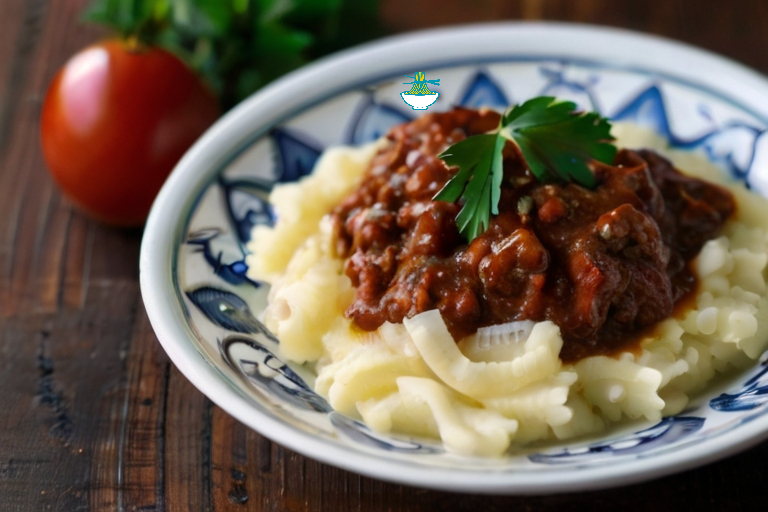Indulge in the hearty flavors of Estonian cuisine with our authentic Hakklihakaste recipe. Hakklihakaste, a traditional Estonian minced meat sauce, is a savory delight that embodies the essence of Baltic gastronomy. Made with finely minced beef or pork, sautéed onions, and a blend of aromatic spices, this rich and comforting dish is sure to tantalize your taste buds. Serve it over a bed of fluffy mashed potatoes or alongside buttery Estonian rye bread for a truly satisfying meal that transports you to the picturesque landscapes of Estonia. Whether enjoyed as a cozy family dinner or shared with friends at a festive gathering, Estonian Hakklihakaste promises to be a memorable culinary experience.
Here's a traditional recipe for Estonian Hakklihakaste:
Ingredients:
- 500g minced beef or pork
- 1 large onion, finely chopped
- 2 cloves garlic, minced
- 2 tablespoons vegetable oil or butter
- 2 tablespoons all-purpose flour
- 500ml beef or vegetable broth
- 2 tablespoons tomato paste
- 1 teaspoon paprika
- 1/2 teaspoon dried thyme
- Salt and pepper to taste
- Chopped fresh parsley for garnish (optional)

Instructions:
1- Heat the vegetable oil or melt the butter in a large skillet over medium heat.
2- Add the chopped onion and minced garlic to the skillet and cook until the onions are translucent and fragrant, about 3-4 minutes.
3- Add the minced beef or pork to the skillet, breaking it apart with a spoon, and cook until browned and cooked through, about 5-6 minutes.
4- Sprinkle the flour over the meat and onion mixture and stir well to combine. Cook for an additional 2 minutes to cook out the raw flour taste.
5- Gradually pour in the beef or vegetable broth, stirring constantly to prevent lumps from forming.
6- Stir in the tomato paste, paprika, and dried thyme. Season with salt and pepper to taste.
7- Reduce the heat to low and let the sauce simmer gently for about 10-15 minutes, or until it has thickened to your desired consistency.
8- Serve the Hakklihakaste hot over a generous serving of mashed potatoes, garnished with chopped fresh parsley if desired.
Enjoy your Estonian-style meat sauce!
Nutritional Values:
Here are the approximate nutritional values for the ingredients used in the Estonian Hakklihakaste recipe per serving:
Minced beef or pork (100g):
- Calories: 250-300 kcal
- Protein: 25-30g
- Fat: 16-25g
- Carbohydrates: 0g
benefits:Rich in protein, essential amino acids, iron, zinc, and B vitamins, which are important for muscle growth, energy production, and overall health.
Onion (1 large):
- Calories: 60 kcal
- Protein: 1g
- Fat: 0g
- Carbohydrates: 14g
- Fiber: 3g
benefits:Contains antioxidants, vitamins C and B6, and fiber, which may help reduce inflammation, support immune function, and promote digestive health.
Garlic (2 cloves):
- Calories: 10 kcal
- Protein: 0.5g
- Fat: 0g
- Carbohydrates: 2g
benefits:Known for its antimicrobial and immune-boosting properties, garlic also contains sulfur compounds that may have cardiovascular benefits and help lower blood pressure.
Vegetable oil or butter (2 tablespoons):
- Calories: 240-260 kcal
- Fat: 28-30g
- Carbohydrates: 0g
benefits:Provides essential fatty acids and fat-soluble vitamins (A, D, E, and K), which are important for cell function, hormone production, and nutrient absorption.
All-purpose flour (2 tablespoons):
- Calories: 60 kcal
- Protein: 2g
- Fat: 0g
- Carbohydrates: 13g
- Fiber: 0.5g
benefits:While not particularly nutritious, flour serves as a thickening agent in recipes like sauces and provides carbohydrates for energy.
Beef or vegetable broth (500ml):
- Calories: 10-20 kcal
- Protein: 1-2g
- Fat: 0-1g
- Carbohydrates: 1-2g
benefits:Can be a source of electrolytes, minerals, and collagen, which may support hydration, joint health, and gut integrity.
Tomato paste (2 tablespoons):
- Calories: 30 kcal
- Protein: 1g
- Fat: 0g
- Carbohydrates: 7g
- Fiber: 2g
benefits:Rich in lycopene, a powerful antioxidant linked to heart health, tomato paste also contains vitamins A, C, and K, as well as potassium.
Paprika (1 teaspoon):
- Calories: 6 kcal
- Protein: 0.3g
- Fat: 0.3g
- Carbohydrates: 1.3g
- Fiber: 0.7g
benefits:Contains capsaicin, which may help boost metabolism and reduce inflammation, along with vitamins A, E, and C.
Dried thyme (1/2 teaspoon):
- Calories: 3 kcal
- Protein: 0.1g
- Fat: 0.1g
- Carbohydrates: 0.7g
- Fiber: 0.3g
benefits:Contains compounds with antimicrobial properties and is a good source of vitamin K and antioxidants, which may support immune function and reduce oxidative stress.
Salt and pepper:
- Negligible calories and macronutrients
Note: The nutritional values provided are approximate and can vary based on factors such as specific brands of ingredients and cooking methods.


Comments